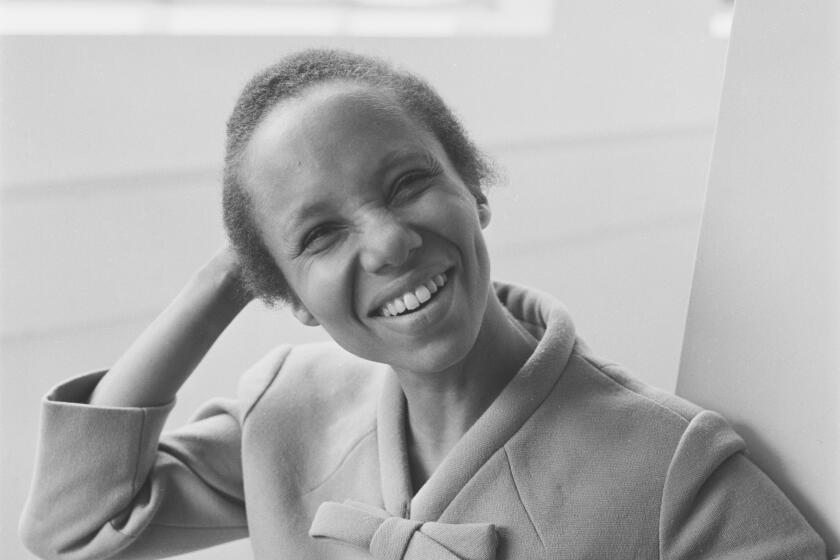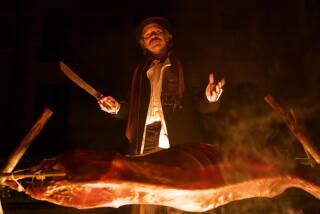Commentary: Lauren Gunderson’s new play is about virologist Nathan Wolfe. Or is it?
“The Catastrophist” is a virtual solo show about Nathan Wolfe, the prolific pandemic expert whose firm specializes in predicting outbreaks. “A highly contagious, deadly virus is a worst-case scenario for epidemiologists,” his character explains to an empty theater. “But that’s my job. Think of the worst-case scenario and prepare for it.”
Available to stream through Feb. 28, the play is the latest STEM-centric stage show from Lauren Gunderson, the most-produced dramatist in America. Some of her works have centered on chemist Marie Curie, scientist Isaac Newton, mathematician Émilie du Châtelet and astronomer Henrietta Leavitt. Those historical figures were researched posthumously; this contemporary subject is literally in-house, as Gunderson and Wolfe are married.
The 80-minute production — a world-premiere co-commission from Northern California’s Marin Theatre Company and Maryland’s Round House Theatre — begins with Nathan on a blank stage, confused about where he is and what he’s doing there. He looks around and deduces that, in this very moment, he’s a character in a play that’s currently being written by Gunderson. “Am I right? Is that what we’re doing? Seems like that’s what we’re doing,” he says. “My wife drags me to enough plays that I recognize the tricks now.”
The character shrugs at the discovery and goes along with it, sharing snippets of how he came to study viruses and what he wishes more people understood about the work that he does. Each scene, marked by title cards, presents a different facet of Nathan: how much he enjoyed his years of research in Cameroon, what he discovered while alone in the basement of the Centers for Disease Control and Prevention, what he’d really like to say about the accusations that his team mishandled an Ebola outbreak. (The show also has vignettes of Wolfe and Gunderson’s relationship and the births of their sons.)
Adrienne Kennedy, a Black playwright who’s more influential than produced, is celebrated in a rare digital festival not to be missed.
Nathan, portrayed with cerebral verve by William DeMeritt, talks fast and passionately about the ins and outs of his vocation. But as I watched him reflect on his career, I wondered if maybe I wasn’t hearing only the voice of Nathan. In a way, I was also listening to Gunderson, Wolfe’s partner of a decade, whose version of him is being presented. I don’t mean the meta framing, or whenever Nathan starts a sentence with the phrase “My wife would like you to know ...” I mean that even though I was being told about Wolfe’s career, it was Gunderson’s work itself that I experienced.
Hints of this juxtaposition are sprinkled throughout the script. Nathan’s explanations of “what science feels like” — the potential high “to discover something true, convince the world, and add to the breadth of human knowledge” as well as “the constant threat that nothing will come of all my efforts and my work will be less than useless to the field I love” — could also be, arguably, what art feels like to Gunderson. When Nathan explains onstage that “good science is a definitive result that answers an important question; proof of what’s true, of what’s really going on,” he could just as easily be talking about good art.
Gunderson was most prominent when Nathan outlines the need for pandemic insurance. “The thing that has become so obvious to me is that yes, loss of life is harrowing and sorrowful, but that is only half the tragedy,” he says. “Loss of livelihood — of jobs and trade and industry and farming and schools and shipping and tourism — loss of how people support themselves and their families is profound and long-lasting and crippling. The death toll is an incomplete measurement of a pandemic’s impact. Because loss of livelihoods are how you cut off an entire planet’s worth of people from their own future.”
The fact that these words were written by someone whose industry came to a complete halt, who had productions suspended indefinitely, whose peers have had their livelihoods yanked out from under them, is not lost on me. Not to mention that they’re asserted onstage by someone playing her life partner, who has been a nearby witness to her career as she has been to his.
I came to consider this possibility because the onstage version of Wolfe has similarities to my own significant other: Matt, who works as a registered nurse in Los Angeles. They both have the same matter-of-fact attitude and dark sense of humor, and have been dragged to more than enough plays. Matt has a job that’s also rooted in science and that prioritizes the preservation of as many people as possible; he too is, as Nathan describes himself, “an expert in a terrible thing.” When you think about it, nurses excel at saving lives because they know all the ways in which a life can end.
Like everyone else, our daily routines have completely shifted because of COVID-19. But while my friends and colleagues have adjusted to working from home and fighting the monotony with indoor activities, we’ve made whatever changes we can to counteract the newfound intensity of Matt’s job, where every single patient is a coronavirus patient. He and his colleagues might provide the only human interaction that patients in isolation will have for weeks. Sometimes, these patients are their own coworkers, friends or family members.
In the Geffen Playhouse’s streaming “Bollywood Kitchen,” cookbook author Sri Rao explores his Indian American heritage with the kitchen as his stage.
Matt’s job has become exponentially arduous, and I’m happy to help him however I can: preparing his workday meals, picking mindless movies to watch and being there to listen to the dealings of his days, no matter how harrowing they may be. We’ve rarely seen any loved ones for coming up on one year, even at a social distance, for fear that his job might put them at risk. (That’s been tough because, aside from being a “healthcare hero,” Matt is also a son, a nephew and a friend. As Nathan says in the play: “Viruses depend on other life to survive. But don’t we all? All life depends on other life. No one exists in isolation.”)
Admittedly, I was taken aback when Nathan opens the show with some blunt lines about the arts-sciences binary: “Theater is not science. That I know. It’s the opposite. She makes the ending whatever she wants it to be. I can’t do that. In fact that would be scientific fraud. Is there theatrical fraud? Isn’t that what theater is? Very nice, well-lit fraud?” Those are poetic echoes of doubts that I, a journalist specializing in an industry that practically collapsed overnight last March, have found myself repeating for nearly a year.
But by the end of the piece, I couldn’t help but feel encouraged. “The Catastrophist” is not only a salute to Wolfe’s work, but to Gunderson’s as well. By using her talents as a playwright to pay tribute to a “virus hunter” on the front lines, Gunderson allows the audience to experience the immeasurable power of both the sciences and the arts — the former in theory and the latter in practice.
Though the nightly cheers, company discounts and outdoor dining ban have ended, the needed efforts of healthcare workers like Matt have not. (This is especially true of those in Los Angeles, where the coronavirus continues to infect thousands of people every day.) He’s still covering himself from head to toe with an intricate ensemble of PPE, coordinating FaceTime calls for dying patients with their families, and wheeling the deceased down to the hospital’s morgue, carefully masking their noses and mouths and disinfecting the exterior of the body bags.
I can’t do what he does. But I’ll follow the lead of Gunderson and her take on Nathan, and do what I can with the abilities that I have. As she wrote/he says in the show: “Anyone can help to heal the world using the talents they’ve been blessed with. What will you do?”
'The Catastrophist'
Where: Streaming through Marin Theatre
When: Through Feb. 28
Tickets: $30 per household
Info: MarinTheatre.org
Running time: 1 hour, 20 minutes (no intermission)
More to Read
The biggest entertainment stories
Get our big stories about Hollywood, film, television, music, arts, culture and more right in your inbox as soon as they publish.
You may occasionally receive promotional content from the Los Angeles Times.












